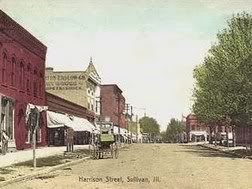On this day...
in Christian History:
December 11, 1518: Swiss Reformer Ulrich Zwingli becomes "people's priest" at the Old Minster Church in Zurich, a position he held for the remaining 13 years of his life. After nearly dying from the plague, he began his reforming program almost immediately, persuading the city council to judge religious issues by Scripture alone.
December 11, 1640: English Puritans introduced a petition with 15,000 signatures to Parliament, seeking to abolish the church episcopacy, "with all its dependencies, roots and branches." The House of Commons accepted what has become known as the "Roots and Branch Petition," but the House of Lords (many of whom were bishops) rejected it, and the episcopal organization of the Church of England remained.
December 11, 1792: Jacob Mohr, author of the poem "Silent Night," is born.
December 11, 1918: Russian author Alexandr Solzhenitsyn, an Orthodox believer whose works include One Day in the Life of Ivan Denisovich and The Gulag Archipelago, is born. His books are credited by many scholars with "helping to bring down the last empire on earth" (see issue 65: The Ten Most Influential Christians of the Twentieth Century).
December 11, 1984: The Reagan White House displays a nativity scene for the first time since courts ordered its removal in 1973.
December 12
December 12, 1189: King Richard I "the Lion Hearted" leaves England on the Third Crusade to retake Jerusalem, which had fallen to Muslim general Salah al-Din in 1187.
December 12, 1582: Spanish General Fernando Alvarez de Toledo (also known as the Duke of Alva) dies. The duke had been sent, along with 10,000 troops, by King Philip II of Spain to quell the Reformation in Holland. The duke's "Council of Blood" was responsible for some 18,000 deaths.
December 12, 1667: The Council of Moscow deposes Russian Orthodox Patriarch Nikon. A "man of great ability and sincerity but of autocratic temper," according to one historian, his calls for liturgical reform grew into a fight over the relationship between church and state. Though deposed at the council, banished, and imprisoned for 14 years, his liturgical reforms were sanctioned. In 1681, he was recalled to Moscow by the new tsar, but he died on the way. He was buried with patriarchal honors and all decrees against him were revoked.
December 12, 1712: The colony of South Carolina requires "all persons whatsoever" to attend church each Sunday and refrain from skilled labor and travel. Violators of the "Sunday Law" could be fined 10 shillings or locked in the stocks for two hours.
December 11, 1518: Swiss Reformer Ulrich Zwingli becomes "people's priest" at the Old Minster Church in Zurich, a position he held for the remaining 13 years of his life. After nearly dying from the plague, he began his reforming program almost immediately, persuading the city council to judge religious issues by Scripture alone.
December 11, 1640: English Puritans introduced a petition with 15,000 signatures to Parliament, seeking to abolish the church episcopacy, "with all its dependencies, roots and branches." The House of Commons accepted what has become known as the "Roots and Branch Petition," but the House of Lords (many of whom were bishops) rejected it, and the episcopal organization of the Church of England remained.
December 11, 1792: Jacob Mohr, author of the poem "Silent Night," is born.
December 11, 1918: Russian author Alexandr Solzhenitsyn, an Orthodox believer whose works include One Day in the Life of Ivan Denisovich and The Gulag Archipelago, is born. His books are credited by many scholars with "helping to bring down the last empire on earth" (see issue 65: The Ten Most Influential Christians of the Twentieth Century).
December 11, 1984: The Reagan White House displays a nativity scene for the first time since courts ordered its removal in 1973.
December 12
December 12, 1189: King Richard I "the Lion Hearted" leaves England on the Third Crusade to retake Jerusalem, which had fallen to Muslim general Salah al-Din in 1187.
December 12, 1582: Spanish General Fernando Alvarez de Toledo (also known as the Duke of Alva) dies. The duke had been sent, along with 10,000 troops, by King Philip II of Spain to quell the Reformation in Holland. The duke's "Council of Blood" was responsible for some 18,000 deaths.
December 12, 1667: The Council of Moscow deposes Russian Orthodox Patriarch Nikon. A "man of great ability and sincerity but of autocratic temper," according to one historian, his calls for liturgical reform grew into a fight over the relationship between church and state. Though deposed at the council, banished, and imprisoned for 14 years, his liturgical reforms were sanctioned. In 1681, he was recalled to Moscow by the new tsar, but he died on the way. He was buried with patriarchal honors and all decrees against him were revoked.
December 12, 1712: The colony of South Carolina requires "all persons whatsoever" to attend church each Sunday and refrain from skilled labor and travel. Violators of the "Sunday Law" could be fined 10 shillings or locked in the stocks for two hours.



0 Comments:
Post a Comment
<< Home